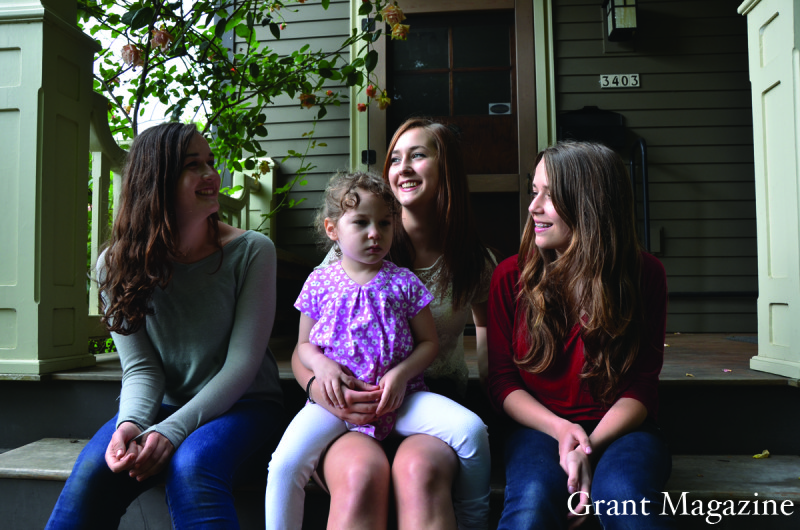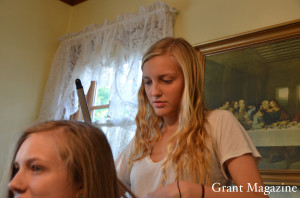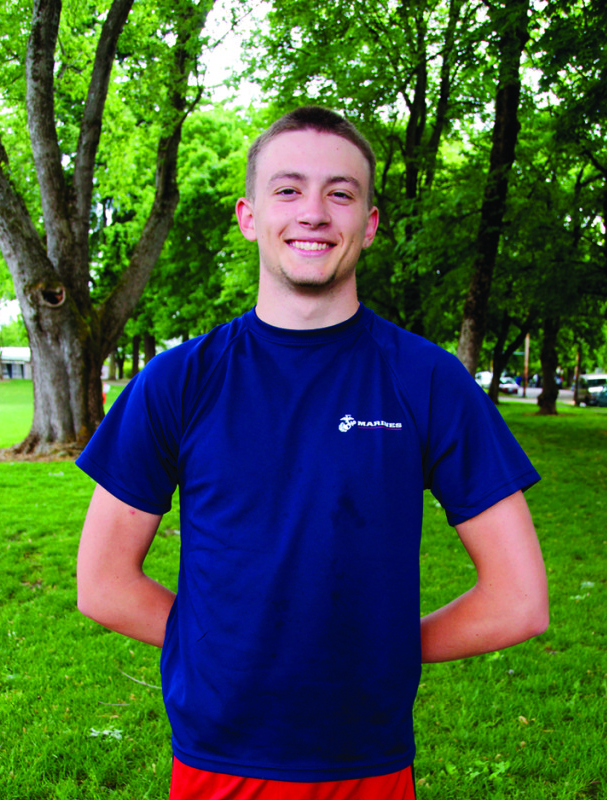
For many students at Grant High School, the obvious move after graduation is to attend a four-year college. But sometimes money, dreams or circumstances lay out a different path as students determine their futures. We talked to a few seniors from Grant’s Class of 2013 who are choosing a non-traditional route after graduation. These are their stories.
Ella Ben-Zaken, 18
Senior Ella Ben-Zaken knew she didn’t want to go directly to college. She remembers thinking about how a lot of her peers are on a fast track through their lives: good grades lead to a good college which leads to a stable job – all before you know who you truly are as a person.
Instead, Ben-Zaken will be taking a gap year. But rather than relax after her years of hard work, she’ll be taking part in a program called “City Year” in New York City where she’ll help struggling students.
Through City Year, Ben-Zaken plans to give back to the community before going to college. She also wants the time of a gap year to figure things out. “You get more maturity that way before going to college,” she explains.
Ben-Zaken has had an interest in helping people for a long time. Her mom, Cynthia Ben-Zaken, recalls a time when her daughter was three and the family spent Christmas in Costa Rica. “She insisted on leaving all of [her] toys for the little girls in the family that was hosting us,” she says. “That’s Ella.”
Her compassion for the people around her includes her family. Ben-Zaken’s twin sisters, Sofia and Milena, are 13, and her youngest sister, Alma, is 3. “It’s fun. It’s crazy,” Ben-Zaken says of having little sisters.
“She is always there to help her younger sisters,” says neighbor Katy Poz. “When her mom asks her to help with the dishes or do something with the family, she’s always willing to help.”
“Our family is remarkably tight-knit,” Cynthia Ben-Zaken says, adding that her daughter is the ringleader of the group. “I really believe that she and her sisters will always have each other’s backs.”
Her devotion to her family and community is visible when she talks about her values and mission in life, says dad Avi Ben-Zaken.
Another important aspect of her life is her relationship with Israel. Ben-Zaken loves when her family visits Israel to connect with her dad’s side. “She feels a deep connection to Israel,” explains her dad, saying he speaks with Ben-Zaken in Hebrew most of the time.
After years of getting to know the country and her family there, Ben-Zaken found herself thinking about staying in Israel after high school.
“Originally, I wanted to go to Israel and do the army,” Ben-Zaken remembers. At 18, citizens serve a mandatory few years in the military, and she considered following in her Israeli family’s footsteps by serving the country. As a woman, she says, she likely would have been in a non-combatant position.
However, Ben-Zaken’s parents had agreed before she was born that any of their children would have to complete a bachelor’s degree before serving.
Abandoning the military service idea for the time being, Ben-Zaken became interested in an AmeriCorps service program called City Year, which she heard about from a friend’s brother. Participants tutor students in danger of dropping out of school, a prospect that intrigued her.
After writing two essays, getting letters of recommendation and four rounds of phone interviews, she’d made the final cut for the program.
“I was so excited,” she recalls. Ben-Zaken chose to go to New York City and was assigned to work in the Bronx. “I love Portland but I want to get out of it and experience the world,” Ben-Zaken says. Admitting that the Bronx seems like a rough place, she adds, “It’ll be an adventure.”
Most people in City Year drop out by Christmas, she says, because it’s a demanding job. Participants tutor, encourage and look after students from before school to long after the day ends. “There’s a lot of problem kids,” Ben-Zaken says. “I just hope that it’ll be so rewarding that I’ll love it after a while.”
“I think it’s going to be really good for her,” says Avi Ben-Zaken. “It’ll give her a chance to get outside the walls and see how to live without your mother and father.”
Ella Ben-Zaken remembers hearing a quote by Howard Thurman: “Don’t ask what the world needs. Ask what makes you come alive, and go do it. Because what the world needs is people who have come alive.”
The quote helped her rethink her ideas for the future. “I want to find something that’s interesting to me but helps the world,” she says.
Caleb Wells, 18
Caleb Wells has a plan. He wants to play professional football someday and plans to eventually attend a four-year university. But in the meantime, he will spend at least a season at Riverside City College in California to improve his game as a lineman.
If the 6-foot-7, 255-pound Wells plays well, he hopes to draw attention from bigger schools. “He’s always had sports dreams,” says his mom, Tracee Wells.
Growing up in Columbus, Ohio, Caleb Wells watched a lot of high school football games. He moved to Portland when he was five, after his parents’ divorce, but continued to visit his dad in Ohio. Wells’ dad and several uncles played college football and he always felt like it was expected of him. He has been playing since fourth grade and hasn’t ever stopped.
He attended Benson Polytechnic High School in 2009 and remembers doing badly in school during his freshman and sophomore years. He was hanging with the wrong crowd, he says, and didn’t try in his classes. “You wanna have fun in high school, but I should have just taken care of business from the beginning,” Wells says now.
Halfway through high school, he started talking with his family about his future. He wanted to continue playing football and he knew he had to graduate from high school. It was time to get back on track. Junior year, Wells stepped up his game and focused on bringing up his GPA.
“I’m pretty smart. I just don’t really apply myself,” he explains.
Wells remembers that doing well in school his junior year helped him improve on the field, too. “It’s an all-around thing for me,” he says. “If you’re doing good in one area, that’ll carry over to the other.”
Junior year was when he really became serious about football. His recruiting was starting to pick up, and he realized that he could go to a Division I school on an athletic scholarship.
The summer of 2012, Wells transferred to Grant to take advantage of the football program. Joining the Grant team his senior year, Wells recalls: “I came in with the mentality to just take everybody out.”
Attitude had been a problem for him in the past. He remembers yelling at referees and not caring much about the team. Wells says his unsportsmanlike attitude lost him some big recruiters during football camps his junior and senior years. “A lot of coaches shy away from players with attitude problems,” says Wells.
A Grant coach made it clear to Wells that the game wasn’t all about him. Now, Wells says he’s a better team player. Football is “definitely a team sport,” he says. “It doesn’t matter if I do my job. If the team loses, we all lose.”
“Football has really helped him understand the team concept,” his mom says, explaining that this is one of the important life skills Wells has learned through his experiences with football.
Tracee Wells says her son watches a lot of football on the weekends and discusses the sport with his uncles. “You can tell that he really understands the game,” she says.
Today, Wells says: “I had the best time playing for Grant.”
Though mostly a starting defensive lineman, Wells has played a lot of different positions. “I was needed in a lot of areas. With my size, I could do a lot of things,” he says.
To prepare for a game, Wells worked hard in practice. Focus was the key.
But focus in school was different. He learned his lesson from his poor grades in the first half of his high school career and tries to maintain a good GPA. It’s easier at Grant, he says, because “the teachers are a lot more proactive in the students’ success.”
Wells has rarely felt interested in his classes during high school; with the exception being his Business and Entrepreneurship class this year. Despite this, he knows that education is important. “If I could go back in high school, I definitely would have stayed more focused,” Wells says, adding: “The attitude – I would have cut that out sooner.”
College will be a fresh slate for Wells.
He had some offers this year from Division I schools, but he turned them down, hoping for a more competitive school. “I feel I could play at a higher level,” he says, explaining that some universities have more impressive programs than others.
Bigger, better, and stronger are his goals for football in the year at Riverside City College. “At the same time, I want to do all I can as far as the team aspect,” says Wells.
Four-year universities will recruit players from this junior college, and Wells hopes he can attract a good offer. “I see it as an opportunity to get better and get a lot more exposure,” he says.
His dream school is Ohio State University, and he’ll play at the highest level he can. “Every kid has the NFL dream,” Wells says. But he has other options in mind.
Wells plans to major in business in anticipation of a career in sports management. “I’ve always had a pretty good business mind and it intrigues me,” he explains. If his opportunities for football dwindle, Wells will have a degree and a direction for his future.
Madison Simonson Kowitz, 17
Right now, college won’t do for senior Madison Simonson Kowitz. She knows what she wants to accomplish in her life and going to a four-year university after graduating from Grant just doesn’t make sense to her.
Simonson Kowitz wants to be a hair stylist, and starting this fall she’ll be attending a year-long program at Beau Monde College of Hair Design in the Lloyd Center Mall. As soon as she completes the program, Simonson Kowitz will be ready to start her career.
She says she won’t miss the traditional college experience. “School isn’t really for me,” Simonson Kowitz says, explaining that she prefers to be more hands on and active than academics sometimes allows.
Softball has been one way for her to express her active side. A member of the Grant team for four years, Simonson Kowitz says softball has been one of her favorite parts of high school.
She also fondly remembers her ceramics classes and her time with the production of Grant’s musical, “Grease.” Her favorite parts of school have been times when she could work to create something physically.
Her need for activity has grown from her efforts at her family’s farm in North Dakota. The farm has been in the family for generations. Simonson Kowitz and her family spend two weeks there every summer, painting the barn, mowing grass and digging up potatoes.
“I’m very hands on,” she explains. “I don’t like sitting in a classroom, because I get bored.”
High school has been a long journey for Simonson Kowitz. After struggling during her freshman and sophomore years, she remembers deciding against going to college. “I haven’t really had fun in school with academics,” she says. “A lot of the teachers haven’t made it fun and exciting.”
Toward the end of her junior year, however, Simonson Kowitz developed an interest in journalism and thought a college education was necessary for a journalistic career. Discussing the idea with her parents, Simonson Kowitz recalls their agreement: she would take the SAT and if she got an above-average score, she should go to college. Otherwise, she should choose a different path.
With average results on the SAT, Simonson Kowitz decided a second and final time that college wasn’t for her. She started to consider other possibilities.
She got a part-time job as a receptionist at The Barbers on Northeast Sandy Boulevard. As she grew more comfortable with the environment of the shop, Simonson Kowitz began developing an interest in hairstyling.
She watched the stylists interact with their customers. “I learned that it’s actually a fun job,” she says.
“She’s always been interested in hair,” says her dad, John Kowitz. In the past she has trimmed her mom’s hair and dyed her sisters’ hair, in addition to getting creative with her friends’ hair before school dances. “Every haircut is a new project,” she says.
Some of her friends haven’t been supportive about her choice. Some labeled her a “beauty school dropout.”
Her parents are another matter. “We are very supportive of her decision,” says Kowitz. “This is what she wants to do. Not everybody goes to college. Not everybody should go to college.”
Classes at Beau Monde won’t be easy either. Students attend sessions from 8 a.m. to 4:30 p.m. Monday through Thursday and have ample homework. Half the day is spent in a classroom and half spent actively working on mannequins and actual customers.
Simonson Kowitz thinks most of the students will be in their twenties and says that is somewhat intimidating. She also worries she won’t pick up on the skills quickly. “Hopefully, it’ll be a good experience,” she says. “I’m pretty confident that it’ll work out.”
She looks forward to starting her career, excited about meeting new clients and trying new styles. As a stylist, she’ll be working with people of all ages and types. “You definitely have to have good people skills,” Simonson Kowitz says.
After her yearlong program, she’ll stay at home with her parents and save up money she earns as a hair stylist. Then, Simonson Kowitz wants to move to Los Angeles, get her own place and earn a business degree at a community college. It’s all part of her plan to open her own hairstyling salon, she says, “doing what I know I’m going to love.” ♦


